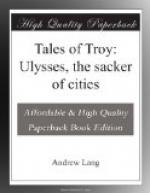Now the Greeks, in pity and sorrow, held their hands, and did not pursue the Trojans who had fled, nor did they strip the armour from Penthesilea and her twelve maidens, but laid the bodies on biers, and sent them back in peace to Priam. Then the Trojans burned Penthesilea in the midst of her dead maidens, on a great pile of dry wood, and placed their ashes in a golden casket, and buried them all in the great hill-grave of Laomedon, an ancient King of Troy, while the Greeks with lamentation buried them whom the Amazon had slain.
The old men of Troy and the chiefs now held a council, and Priam said that they must not yet despair, for, if they had lost many of their bravest warriors, many of the Greeks had also fallen. Their best plan was to fight only with arrows from the walls and towers, till King Memnon came to their rescue with a great army of Aethiopes. Now Memnon was the son of the bright Dawn, a beautiful Goddess who had loved and married a mortal man, Tithonus. She had asked Zeus, the chief of the Gods, to make her lover immortal, and her prayer was granted. Tithonus could not die, but he began to grow grey, and then white haired, with a long white beard, and very weak, till nothing of him seemed to be left but his voice, always feebly chattering like the grasshoppers on a summer day.
Memnon was the most beautiful of men, except Paris and Achilles, and his home was in a country that borders on the land of sunrising. There he was reared by the lily maidens called Hesperides, till he came to his full strength, and commanded the whole army of the Aethiopes. For their arrival Priam wished to wait, but Polydamas advised that the Trojans should give back Helen to the Greeks, with jewels twice as valuable as those which she had brought from the house of Menelaus. Then Paris was very angry, and said that Polydamas was a coward, for it was little to Paris that Troy should be taken and burned in a month if for a month he could keep Helen of the fair hands.
At length Memnon came, leading a great army of men who had nothing white about them but the teeth, so fiercely the sun burned on them in their own country. The Trojans had all the more hopes of Memnon because, on his long journey from the land of sunrising, and the river Oceanus that girdles the round world, he had been obliged to cross the country of the Solymi. Now the Solymi were the fiercest of men and rose up against Memnon, but he and his army fought them for a whole day, and defeated them, and drove them to the hills. When Memnon came, Priam gave him a great cup of gold, full of wine to the brim, and Memnon drank the wine at one draught. But he did not make great boasts of what he could do, like poor Penthesilea, “for,” said he, “whether I am a good man at arms will be known in battle, where the strength of men is tried. So now let us turn to sleep, for to wake and drink wine all through the night is an ill beginning of war.”




